Understanding risk management in cryptocurrency trading is as important as what crypto to trade and when. In another article at Blockcircle, we talked about how crypto leverage trading works, but we haven’t delved into how to manage risk such that when a trade isn’t going our way, we don’t lose more money than we anticipated.
Want to learn more about risk management in cryptocurrency trading? Continue reading and learn about how to calculate risk, managing a trading account and opening multiple positions to average down or average up.
Calculating risks in crypto trading
Consider the following price action in this SOL/USDT chart. From the latest candle, we’re seeing a possible retracement, although the SMA10 still indicates that it’s a strong bearish trend. The candles are also respecting the SMA10 up until the most recent candle.
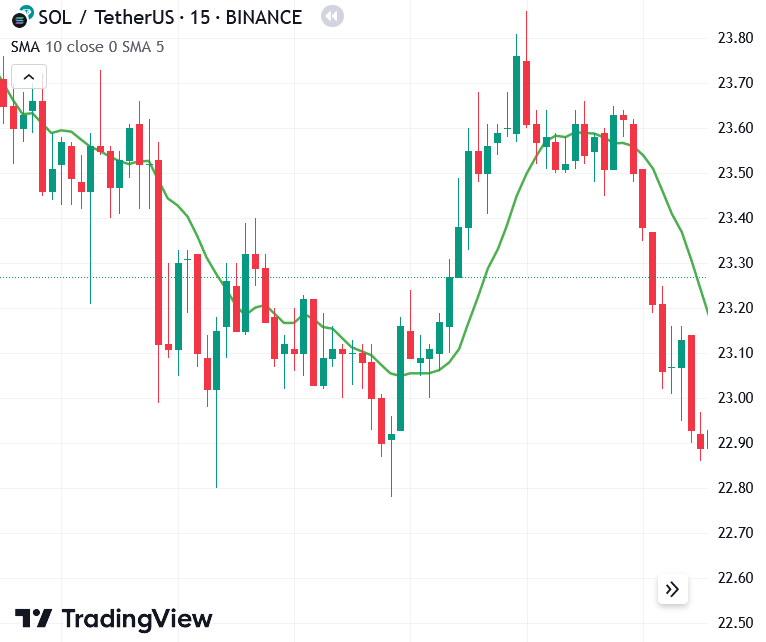
If you’re a trader, what will you do at this time? If you place a short trade now, you must anticipate a retracement — if you don’t, you’re not managing your trading risk. A retracement could mean two things:
- A temporary setback before the price continues its downward trend.
- A bottom has been reached, and the trend will flip to bullish.
Either way, we don’t know which one will happen for certain. What we can do is to make an assumption. A common assumption shared among traders is that if the price breaks the support or resistance levels once in a strong trend (respecting the SMA10 – SMA20), there’s a high likelihood it will break the pattern and flip the trend.
This assumption can be used in our case, because the SMA10 has been respected for quite some time, however, the price is heading towards a horizontal strong support line (at $22.80), which could signal its bottom. This supports the case that the trend may flip to bullish.
For our purpose, let’s assume that we’re planning to place a short position. Again, we’ll use the SMA10 as our resistance line. The SMA10 is at $23.18, which is 1.27% higher than the spot price at $22.89.
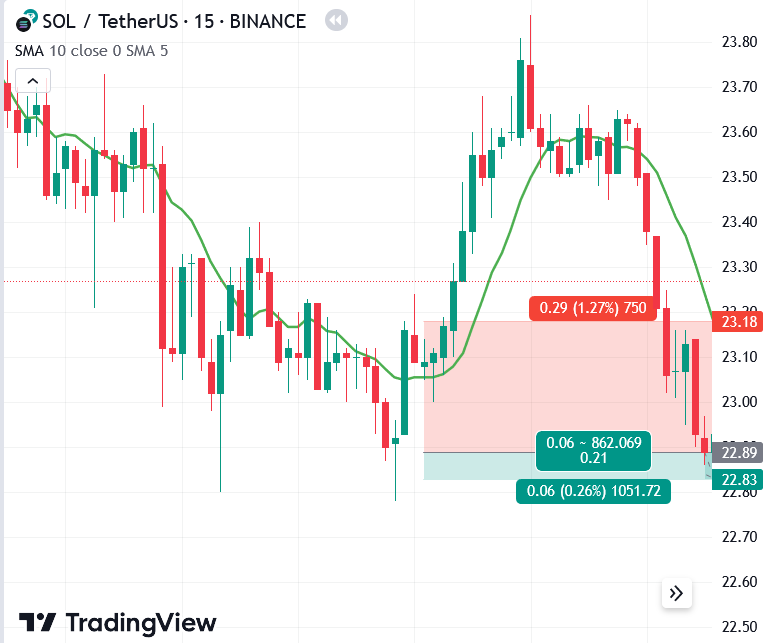
That means, if we place a short trade, the price cannot go up by more than 1.27%. If it does, the trend is indeed reversing, and a breakout is occurring. If the price goes up by more than 1.27%, it’s better to exit out of the trade and realize the loss earlier, than to stay in the losing trade and lose a lot more. Therefore, we must place a stop loss at $23.18 where the SMA10 is.
We haven’t really talked about the most common advice in trading — Do not risk more than 1% of your total capital into a single trade. There’s some practical reasoning behind this. With risking just 1%, you can open at least 100 more trades (and there’s still going to be money left in your account). If you lose 100x in a row, you’d lose 60% of your initial capital, and there’ll be a chance for you to re-evaluate your trading strategy.
Let’s say you started with $1000 for crypto trading. Risking 1% of that means you’d need to be careful of not losing more than $10 for this particular trade. Now let’s do some math.
If the price goes up by 1.27%, you lose $10. What is the exact position size required to execute this trade? Here is the formula to find the answer:
Position size = ( 1 / stop loss distance in percentage ) x trading capital
= ( 1 / 1.27 ) x $1000 = $787.40
To check, a losing short trade with $787.40 position size will have a value of about $777.40 if the price moves up 1.27%. This is $10 of unrealized loss.
Risk management in crypto trading — open multiple positions
Many trading platforms allow you to open multiple positions for the same crypto asset. The trading screen will often show you the average price of your position. Opening multiple positions is often useful in volatile conditions when you’re not sure about your timing. Let’s see how this can be done.
Consider the following SOL/USDT chart. In this example scenario, we miss out on the large uptrend, but it’s possible that the trend could sustain itself. So, it’s wise to place a long trade when a retracement occurs.
However, we don’t want to wait for too long, because oftentimes during a strong bullish trend, retracements don’t always neatly touch the support line. In this uncertain situation, we can open multiple smaller positions. If the price continues to go down, we can still buy the asset at a lower price. If not, we can still make a profit from the smaller positions we set over time.
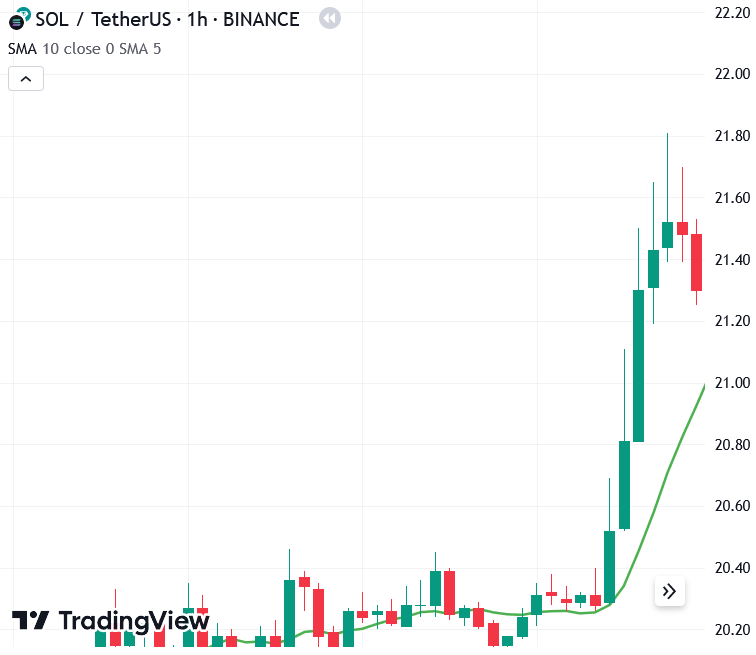
First, determine how many positions you’d like to open, and secondly, decide on the stop loss level. The stop loss level determines the price’s “point of no return”, where the strong bullish trend could flip over its head.
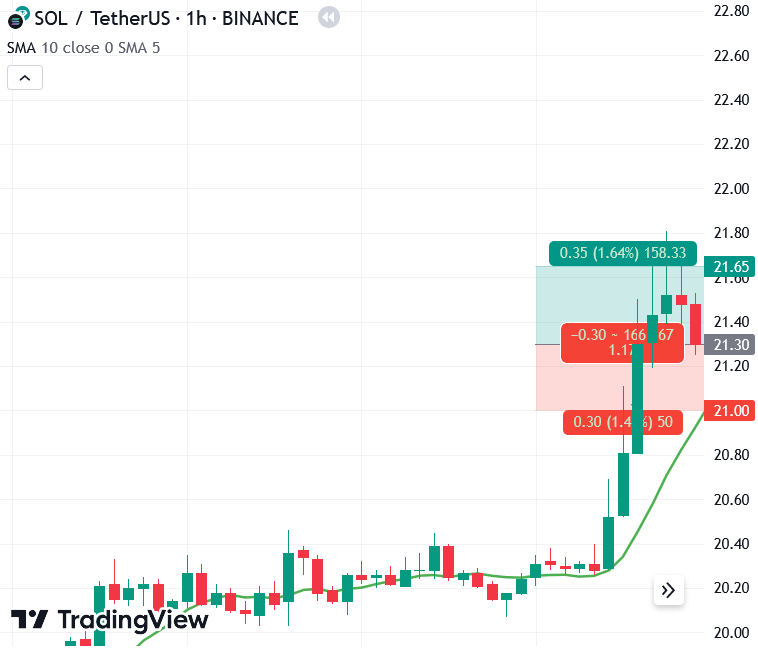
The stop loss is 1.41% below the current price, and we’ve decided on placing 4 open positions, all obeying the same stop loss level. However, since we’re opening 4 positions, all of them will contribute to the same 1% risked capital that we’ve established before.
For each position, we modify the formula:
Position size 1 = ( 0.25 / stop loss distance in percentage ) x trading capital
= ( 0.25 / 1.41 ) x $1000 = $177.30, which buys 8.3239 SOL.
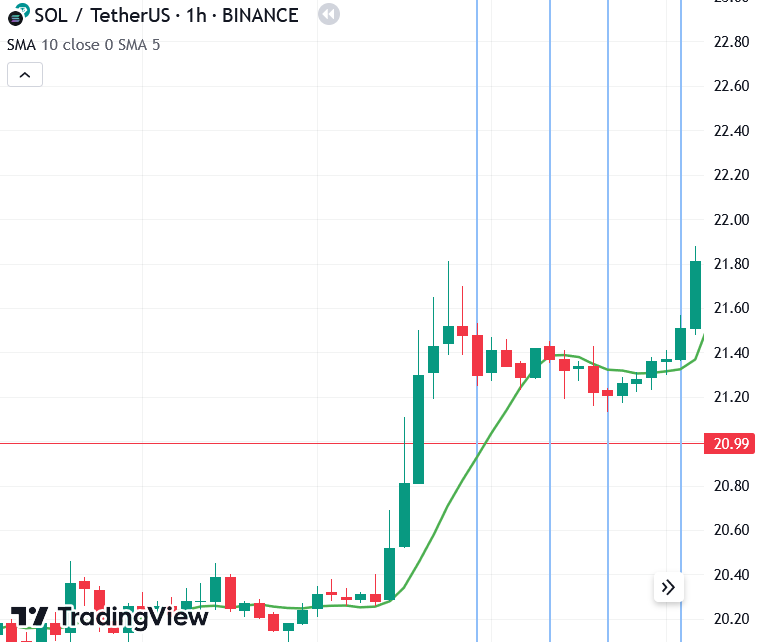
Position 2 is opened at a slightly higher price, so the stop loss distance is greater at 1.74%. Therefore, the position size is ( 0.25 / 1.74 ) x $1000 = $143.67, buying 6.7198 SOL.
Position 3 is opened at a discounted price, where the position size is (0.25 / 0.74) x $1000 = $337.83, buying 15.9809 SOL
Position 4 — ( 0.25 / 1.76 ) x $1000 = $142.04 for 6.6469 SOL
Now, why do we need to care about the amount of SOL bought? Because we want to know the average buy price for Solana after we open 4 positions at different prices. (Some trading platforms do this automatically for you).
Average buy price = Total invested / Total SOL accumulated = $21.25 / SOL.
If we had placed a single order at Position 1, we would have gotten an average price of $21.30. The lower the average buy price, the higher the profitability of the entire collection of open positions.
Blockcircle helps you trade
Blockcircle is a private trading and investment management community of computer scientists, quant traders, financial engineers and executives that come together to combine all their skills and experiences to create high quality trading signals.
Trading signals will recommend you the best trading positions set up based on thorough market analyses, so you don’t have to get lost in all the indicators and chart patterns that you may not fully understand. With trading signals, you can easily know the best stop losses to place, ensuring that your trading account is safe and far away from irresponsible trading.
The group was founded in 2017 and has experienced two peak crypto bull markets in 2018 and 2021. These two periods of time have been a chance for many ordinary people to generate wealth, and become financially secure.
To learn more about what we can do for you, visit blockcircle.com.




